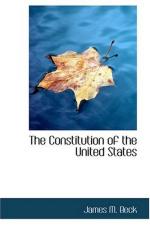When the delegates from nine States had assembled, Washington was unanimously elected the presiding officer of the convention. It began by adopting rules of order, and the most significant of these was the provision for secrecy. No copy should be taken of any entry on the Journal, or even permission given to inspect it, without leave of the convention, and “nothing spoken in the house be printed or otherwise published or communicated without leave.” The yeas and nays should not be recorded. The rule of secrecy was enlarged by an unwritten understanding that, even when the convention had adjourned, no disclosure should be made of its proceedings during the life of its members. When after nearly four months, the convention adjourned, the secret had been kept, and no one knew even the concrete result of its deliberations until the Constitution itself, and nothing else, was offered to the approval of the people. The high-way, upon which the State House fronted, was covered with earth, to deaden the noise of traffic, and sentries were posted at every means of ingress and egress, to prevent any intrusion upon the privacy of the convention. The members were not photographed daily for the pictorial Press, nor did any cinema register their entrance into the simple colonial hall where they were to meet. Notwithstanding this limitation—for no present-day conference or assembly can proceed with its labours until its members are photographed for the curiosity of the public—these simple-minded gentlemen—less intent upon their appearance than their task—were to accomplish a work of enduring importance.
The extreme care which was taken to preserve this secrecy inviolate, and its purpose, were indicated in an incident handed down by tradition.
One of the members dropped a copy of a proposition then before the convention for consideration, and it was found by another of the delegates and handed to General Washington. At the conclusion of the session, Washington arose and sternly reprimanded the member for his carelessness by saying:
“I must entreat gentlemen to be more careful, lest our transactions get into the newspapers and disturb the public repose by premature speculations. I know not whose paper it is, but there it is [throwing it down on the table]. Let him who owns it, take it.”
He then bowed, picked up his hat and left the room with such evidences of annoyance that, like school-children, no delegate was willing to admit the ownership of the paper.
The thought suggests itself: How different the result at Versailles and Genoa might have been had there been the same reasonable provisions for discussion and action uninfluenced by too premature public comment of the day! In these days, when representative government has degenerated into government by a fleeting public opinion, the price we pay for such government by, for and of the Press, is too often the inability of representatives to do what they deem wise and just.




